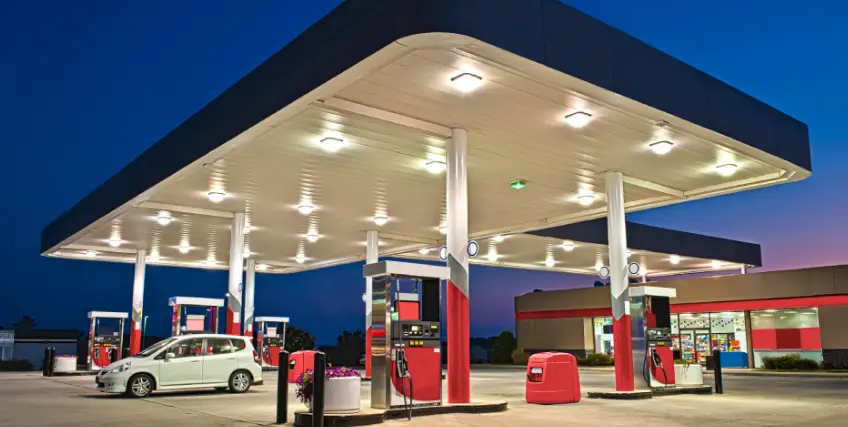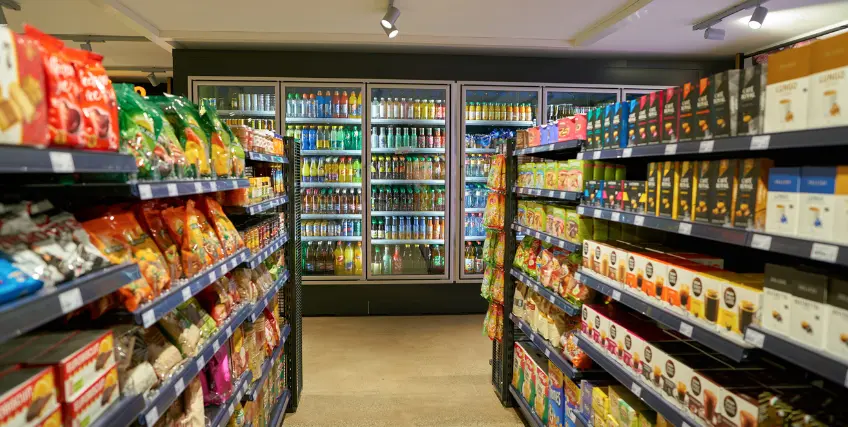The Fuel for Success: Innovative Ways to Finance Your Gas Station Convenience Store
February 14, 2025 | Last Updated on: February 17, 2025

Fuel for Success: Innovative Ways to Finance Your Gas Station Convenience Store
Convenience stores, like Circle-K, 7-Eleven, Wawa, or EG America, are cornerstones of many communities. But most aren’t owned by large corporations—over 60% of convenience store operators own between 1-10 properties.
If you’ve ever considered opening a convenience retail store, you may wonder how you’d finance the costs. Unless you have the cash sitting in your bank account, you’ll likely need a corner store loan or convenience store financing.
Convenience store operators have unique considerations when seeking business loans. Most lenders will want to ensure that you meet the gas station regulatory requirements and have the necessary permits to run your business, along with the standard business plans needed for most business financing.
In this article, we’ll explore how to get a business loan for convenience stores.
Convenience Store Industry Outlook
Despite challenges in keeping up with consumer demand for innovations like contactless payments, digital solutions, and healthier product options, the convenience store industry has seen a steady growth of 2.8% over the past five years, with convenience store chains 7-Eleven, Wawa, and Alimentation Couche-Tard, leading the pack.
Here are some other interesting C-store statistics:
- The U.S. convenience store industry was worth 45.5 billion in 2024.
- The convenience store count for the United States was 152,255 in 2025, with Texas having more convenience store operators than any other state, followed by California, Florida, New York, Georgia, Ohio, and North Carolina.
- Convenience stores account for 80% of the fuel purchased in the U.S., while also catering to food service consumers wanting to avoid the supermarkets for beverages, snacks, and everyday essentials.
- The convenience store industry will grow at a compound annual growth rate (CAGR) of 3.34% through 2034.
If you're considering opening a convenience store, expanding an existing one, or even hoping to open a franchise, the first step is considering how you’ll fund your venture.
What Can a Business Loan for Convenience Stores Be Used For?
Convenient store loans offer funding for various needs. Depending on the type of loan, C-Store financing can bolster your business’s working capital, help you provide top-tier service, fuel your business’s growth, and replenish stock to keep your shelves full.
Here are some ways convenience store operators can use a corner store loan:
- To buy into a convenience store franchise like QuikTrip, Casey’s General Store, Murphy USA, and others
- Inventory and stock
- Commercial real estate purchases
- Consolidation of business debt
- Refinancing of current business debt
- Partner buyouts
- Expansion of an existing C-Store business
- Modernization of the store
- Working capital
- Operational expenses such as payroll, taxes, insurance, and more
- To replenish cash flow shortages
- To repair or upgrade infrastructure
- For equipment such as:
- store displays
- refrigerators
- coffee machines
- POS systems and IT upgrades
- electric vehicle charging stations
- gas station equipment, such as canopies and signage, underground tanks, fuel dispensers, and more
- carwash equipment, including vacuum and water systems, tunnels, polishing machines, and more
Financing Requirements for Convenience Store Operators
The basic requirements for a convenience store operator seeking funding are similar to the requirements of any small business loan. Lenders will examine the overall financial health of the business by reviewing how long you’ve been in business, your credit score and history, the cash flow of your business, and its annual revenue.
With gas station convenience stores, lenders will also add a few other considerations, including compliance and regulatory measures. For example, lenders will want to ensure that you adhere to zoning and environmental laws and have the correct permits.
Gas stations are subject to strict regulations. You’ll likely need multiple permits for installing and operating fuel storage tanks and spill containment. Health department permits are typically also required since convenience stores handle food. Plus, you’ll need alcohol, and tobacco permits if you sell those products in your C-Store.
All these permits typically cost more than standard small business permits. Including these costs in your C-Store funding can make the financial impact more manageable.
Finally, most C-Store loan providers will likely analyze the location of your convenience store. C-stores in prime locations do better than those off the beaten path. You’ll have an easier time getting approved, potentially with a better interest rate if your convenience store is in a high-traffic area where people can Google “convenience store open near me” and find your business.
Financing Options for Convenience Store Operators
There are a few options to fund your gas station convenience store. Here’s a look at the pros and cons of each.
Traditional Loans
- Pros: Large loans are possible, competitive interest rates, and generous repayment periods.
- Cons: Requires strong collateral, higher downpayment, and excellent credit; the application process is lengthy and strict.
SBA Loans
- Pros: Lower down payment, maximum loan amount up to $5 million, favorable terms, including lower interest rates and longer repayment times.
- Cons: The application process is complex and lengthy and can take months, rising FED rates mean a higher interest SBA loan.
Alternative Loans (Online Lenders)
- Pros: More flexible than traditional lenders and the SBA, provides fast funding, can apply online from home, credit doesn’t have to be perfect.
- Cons: Interest rates may be higher if credit isn’t good.
Equipment Financing
- Pros: Equipment serves as collateral, easier to get approval than most, many lenders offer equipment financing.
- Cons: Loan term is limited to the useful life of the equipment; there’s always a chance that the equipment will break or become obsolete before the loan is paid off.
Business Lines of Credit
- Pros: Immediate access to funds when needed, preapproved credit line that works similar to a credit card, interest paid only on credit line used, can be used for a variety of purposes including working capital, equipment, inventory, etc.
- Cons: Business lines of credit may not be high enough for major purchases, and interest rates can be high.
Revenue-based Financing
- Pros: Offered by online lenders, expedient access to funds, often no need for collateral as repayment is based on future revenue receivables, funds can be used for a variety of needs.
- Cons: Need to show robust revenue, the maximum loan amount can be more limited, depending on your C-Store’s revenue, cost of the loan may be higher, depending on credit history.
Deciding on a Business Model
Before you apply for funding for your convenience store, you need to decide on the features that you would like to include with your convenience store. Options include:
- Gas station
- Truck stop (like Sheetz or Love’s Travel Stop)
- Travel center (like Casey’s and Kwik Trip)
- Car wash
The features and business model you settle on will affect multiple factors for your business. For example, a travel center will need to be located near or just off a freeway or interstate. You’ll also likely need a lot more capital to pull it off, which might limit the type of loan you can qualify for.
On the other hand, a gas station convenience store located in a high-traffic area of your city might cost less, depending on where you live.
Next Steps: Writing a Business Plan and Getting Funded
Once you’ve decided on a business model for your convenience store and researched how much capital you’ll need, it’s time to get a business plan together. A business plan for a convenience store should be more comprehensive than a standard business plan.
For example, you’ll want to include the following:
- Executive Summary: An executive summary should state where your convenience store will be located, the products and services offered, and the demographics it will serve. The summary should include information about you and your management’s business experience. Cite why you believe the business can be a success.
- Industry Statistics: This should include data on the growth of the convenience store industry, local factors such as competition, etc.
- Customer Analysis: This section can focus on who you intend to target and serve. For example, if you plan to operate your convenience store near a university, a large number of your consumers are likely to be college students. Or, if you’re located in a bustling office and business community, it might be young professionals. Provide an estimation of the potential number of people your business might serve.
- Marketing Plan: Distinguish your value proposition and how you plan to promote your convenience store. Include strategies like loyalty programs, social media campaigns, local publications, and community marketing initiatives.
- Financial Plan: Finally, you’ll need a solid financial plan to make your business plan come together. Put together any financial documents required by the lender including profit and loss statements, balance sheets, cash flow statements, tax returns, and bank account statements. Include projected operating expenses such as wages, lease or mortgage, utilities, insurances, etc, with a projection of accounts receivable.
- Funds Request: Finally, give a final rendering of the amount you need to borrow with projections of how it will be used.
Choosing a Lender
Before you choose a lender, it’s vital to understand each lender’s requirements. First, obtain a copy of your credit reports so that you know where you stand credit-wise. If you have excellent credit, then it’s possible to obtain a bank loan or SBA funding. But, if you don’t, an alternative lender or online business loan broker might be a better option.
Once you decide on which lender is best, learn about which fees they charge and how fast you can obtain funds. Traditional lenders can take two months or more while alternative loan providers can sometimes approve your convenience store or gas station loan much quicker.
Frequently Asked Questions (FAQs)
What can I use as collateral to get a corner store loan?
Some of the common types of collateral used by convenience store operators include personal assets like private savings or real estate or business assets such as equipment, real estate, or other business assets.
How much does it cost to start a convenience store?
It depends on your business model. A smaller convenience store might cost as little as $50,000 to $200,000. But a larger store, particularly a franchise or chain, can cost upwards of $2 million.
Can I succeed if there is already a convenience store near my location?
It’s certainly possible. Many areas have multiple convenience stores. Researching your area can help you determine your potential success and how you can establish a unique value proposition that sets you apart as a convenience store operator.
Is an alternative lender better than a traditional lender or the SBA for my gas station funding?
It depends, but it often can be. Gas station loans are considered high-risk by banks, so the approval rate is very low. Meanwhile, the underwriting process can cost you the essential time to get your gas station up and running. Alternative lenders usually have more relaxed lending requirements and can fund you more quickly.
Frequent searches leading to this page
Related Articles
The Fuel for Success: Innovative Ways to Finance Your Gas Station Convenience Store
February 17, 2025
Rising Stars in a Tight Credit Market: Gas Stations & Convenience Stores
February 17, 2025
Is Business Financing the Right Choice for Your Convenience Store Expansion?
February 17, 2025




